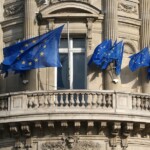“An economic balloon filled with easy money is no different than a real one filled with helium: If you keep inflating it, it will eventually burst. On the other hand, if you let their helium out, it will sink to the ground.“
When Turkish voters go to the polls on May 14, they will be voting for a president and a parliament. Effectively they will also be voting for the man who will be piloting the Turkish economic balloon. And, whoever wins will have the misfortune of watching it crash to the ground, regardless of what policies he chooses to undertake.
Under Recep Tayyip Erdogan, the Turkish economy has been inflated irresponsibly by generous government spending, especially as Election Day approaches, and a monetary policy that defies conventional wisdom by keeping interest rates low in the face of rising inflation.
The result is a balloon economy. Turkey ostensibly continues to fly high with impressive rates of economic growth because interest rates are low, and government spending has been pumping consumption and construction. But the lira’s value has halved and worse, to about 19.5 to the dollar today from 7.5 two years ago.
In consequence, inflation has been running deep into the double digits since 2016 (according to official statistics – independent economists say it is currently more than double that, or above 100 percent). Turkey is running a persistent and ultimately unsustainable current account deficit, which reached 6 percent of GDP over the past 12 months.
To keep his balloon afloat, Erdogan has been relying on infusions of cash from the Gulf and Russia. But an economic balloon filled with easy money is no different than a real one filled with helium: If you keep inflating it, it will eventually burst. On the other hand, if you let their helium out it will sink to the ground. Those, in effect, are the two choices Turkey faces in the months ahead.
Given polls showing the state of the economy to be to be by far the voters’ top concern, this election should be a shoo-in for the Table of Six alliance led by Kemal Kilicdaroglu – all the more so because most of Turkey’s economic problems were the result of policies Erdogan took despite economists’ warnings and stark evidence that they were failing.
Yet, it is by no means clear that Kilicdaroglu has the election in the bag, and even if he does win, he may not have a workable parliamentary majority. Polls show that neither he nor Erdogan will win more than half the votes in the first round May 14; in the second round, the polls are divided on the outcome of what they agree will be a close race.
Erdogan has promised voters policy changes that will bring inflation down into the single digits and has formed a team led by Mehmet Simsek, a highly regarded orthodox economist, to design them. But if the president and his Justice and Development party, or AKP, retain power, economists doubt he will abandon his old “New Economy Model” of low interest rates to spur continued investment and intervention in the foreign currency market to prevent the lira from weakening even more.
So the Turkish balloon will fly higher for a while, but it will burst, probably sooner than later. Bilge Yılmaz, a professor of finance at the Wharton School and (caveat emptor) an adviser to the opposition coalition, says that with just a few months’ worth of foreign currency reserves, a persistent trade deficit, and little foreign capital entering the country, the country is headed for a balance of payments crisis.
What Erdogan will do next is anyone’s guess – impose capital controls, or turn to the hated International Monetary Fund and the onerous conditions it will insist on for aid? Either way, the economy is in for rough times.
A win for Kilicdaroglu promises trouble of a different sort. On paper, he and his motley coalition of center-left and right-wing parties are promising a return to “orthodox economics,” which would be a welcome development for Turkey’s long-term future. But for the short-term, it would spell a lot of pain because it entails trimming government spending and raising interest rates, perhaps to 30 percent or more from just 8.5 percent today.
Turkey might be spared a balance of payments crisis, but orthodox economics means letting the air out of the balloon, and that will bring the economy down to earth with a thud. Just one small example of the potential fallout: How will builders begin rebuilding the 520,000 housing units destroyed in February’s earthquake if construction loans are so expensive?
Kilicdaroglu has a strong economic policy team that might be able to pull off a softer landing, but President Kilicdaroglu’s unwieldy coalition may not give them the freedom to act. There are local elections next year, and political leaders are not going to want to fight them amid a deep recession. In any case, the AKP may set up roadblocks to key elements of the reforms, such as central bank independence.
But Kilicdaroglu’s deeper problem is the poisoned legacy of 20 years of Erdogan rule. As Liam Peach, an emerging markets economist at Capital Economics in London, warns: “The scale of the task will be huge. Inflation is so entrenched … and macro imbalances run so deep that simply restoring central bank independence and raising interest rates will not be enough – a prolonged period of very tight monetary and fiscal policy will be needed. This will come with economic costs and it is not yet clear that there is appetite for this.”
In other words, the medicine the opposition plans to administer may take a long time to work while the side effects take effect immediately.
Another problem: The Turkey of Erdogan’s early years in power (roughly the first decade this century) has been lauded as an era of economic growth and development. It was only in the last decade that the Turkish leader’s regime of corruption and bizarre economic policies undid these achievements.
While it’s true the economy did record an impressive expansion rate of about 7 percent annually in 2002-2007, the Erdogan government never made good use of it to introduce policies that would ensure sustainable growth. Turkey developed a large manufacturing sector and enjoys good access to the European markets, but productivity has been in decline, the business sector is beset by cronyism and corruption, and the country’s best and brightest have been fleeing for lack of opportunities.
Extricating the economy from these foundational problems will require a lot of effort, not just on the economic front but on the political front as well.
Kilicdaroglu and his allies have promised to restore democratic norms and the rule of law – and they will no doubt be helped by Western powers, but undoing that part of the Erdogan legacy will not be easy. It will mean striking out at powerful interests and ending benefits that had been bestowed on ordinary Turks.
This article was originally published by Haaretz.
The views and opinions expressed above are the author’s and do not reflect those of the Free Turkish Press.


